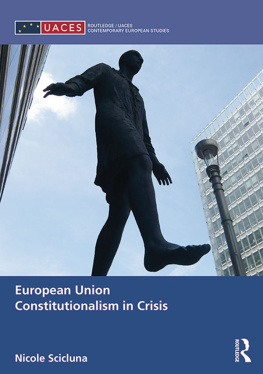The European debt crisis
European Policy Research Unit Series
Series Editors: Simon Bulmer, Peter Humphreys, Andrew Geddes and Dimitris Papadimitriou
The European Policy Research Unit Series aims to provide advanced textbooks and thematic studies of key public policy issues in Europe. They concentrate, in particular, on comparing patterns of national policy content, but pay due attention to the European Union dimension. The thematic studies are guided by the character of the policy issue under examination.
The European Policy Research Unit (EPRU) was set up in 1989 within the University of Manchesters Department of Government to promote research on European politics and public policy. The series is part of EPRUs effort to facilitate intellectual exchange and substantive debate on the key policy issues confronting the European states and the European Union.
Titles in the series also include:
Globalisation and policy-making in the European Union Ian Bartle
The Europeanisation of Whitehall Simon Bulmer and Martin Burch
The agency phenomenon in the European Union: Emergence, institutionalisation and everyday decision-making Madalina Busuioc, Martijn Groenleer and Jarle Trondal (eds)
EU enlargement, the clash of capitalisms and the European social dimension Paul Copeland
The power of the centre: Central governments and the macro-implementation of EU public policy Dionyssis G. Dimitrakopoulos
Creating a transatlantic marketplace Michelle P. Egan (ed.)
Immigration and European integration (2nd edn) Andrew Geddes
The European Union and the regulation of media markets Alison Harcourt
Childrens rights, Eastern enlargement and the EU human rights regime Ingi Iusmen
Managing Europe from home: The changing face of European policy-making under Blair and Ahern Scott James
The politics of fisheries in the European Union Christian Lequesne
The European Union and culture: Between economic regulation and European cultural policy Annabelle Littoz-Monnet
The Eurogroup Uwe Puetter
EU pharmaceutical regulation Govin Permanand
Regulatory quality in Europe: Concepts, measures and policy processes Claudio M. Radaelli and Fabrizio de Francesco
Unpacking international organisations: The dynamics of compoundbureaucracies Jarle Trondal, Martin Marcussen, Torbjrn Larsson and Frode Veggeland
The European debt crisis
The Greek case
Costas Simitis
Translated from the Greek by P. Douzina-Stiakaki
Revised by Ewan Munro
Manchester University Press
Manchester and New York
distributed in the United States exclusively
by Palgrave Macmillan
Copyright 2012 by POLIS Publishers and Constantinos Simitis.
First English-language edition published in 2014 by Manchester University Press Oxford Road, Manchester M13 9NR, UK
Published by Manchester University Press
Oxford Road, Manchester M13 9NR, UK
and Room 400, 175 Fifth Avenue, New York, NY 10010, USA
www.manchesteruniversitypress.co.uk
Distributed exclusively in the USA by
Palgrave Macmillan, 175 Fifth Avenue, New York,
NY 10010, USA
Distributed exclusively in Canada by
UBC Press, University of British Columbia, 2029 West Mall,
Vancouver, BC, Canada V6T 1Z2
British Library Cataloguing-in-Publication Data
A catalogue record for this book is available from the British Library
Library of Congress Cataloging-in-Publication Data applied for
ISBN 978 0 7190 9579 5 hardback
ISBN 978 0 7190 9578 8 paperback
First published 2014
The publisher has no responsibility for the persistence or accuracy of URLs for any external or third-party internet websites referred to in this book, and does not guarantee that any content on such websites is, or will remain, accurate or appropriate.
Typeset in Sabon by R. J. Footring Ltd, Derby, UK
Contents
In September 2009, the G-20 Summit at Pittsburgh, USA, also confirmed that the response to the 2007 crisis had been successful. It was noted that positive rates of economic growth had returned.
But there were also some critical voices, pointing out that the aftermath of the 2007 crisis was not so rosy. Experience, they maintained, shows that financial crises open up deep wounds. When sovereign debt grows beyond certain levels, restrictive policies become necessary. Growth does return but at a much lower rate than before and the risk of long-term stagnation is great. However, a widespread feeling that the crisis was over prevailed and with it came the conviction that stability and growth would soon follow. What failed to be predicted was the extent to which a sovereign debt crisis would create serious problems for the functioning of the European Union (EU).
By mid-October 2009, commentators appeared increasingly concerned that the fear of debt shall replace the existing fear of crisis. Projections of the fiscal performance of member states revealed that in many countries budget deficits would far exceed the 3% limit stipulated by EU treaties and, in many cases, would reach between 5% and 10% of gross domestic product (GDP). Such deficits, under the recession fuelled by the crisis, would lead to a fast rise in sovereign debt. Certain economists maintained that governments should react swiftly with public spending cuts. However, the then dominant view within the Union held that it was too early to implement a common strategy for curbing debt. Every country would, therefore, have to show prudence and strive for economic stability independently, using whatever national means it had at its disposal.
In this climate of doubt and indecision the news that Greeces deficit for 2009 had reached 12% of GDP turned everyones attention on Athens. European public opinion felt that Greece had squandered European funds and goodwill and, as such, did not belong in the Eurozone. Greece was an example that proved how mismanagement leads to crisis. Greeces predicament, it was thought, was exceptional, not the result of the Eurozones own design.
As the crisis unfolded, it became apparent that other Eurozone countries displayed identical symptoms to those of Greece, albeit to a different degree. Portugal, Ireland, Spain and even Italy were described as countries in danger. From being a strictly Greek problem, the debt crisis now turned into a problem for the Eurozone and the EU as a whole. The attempts to deal with it raised the need to restructure European institutions. The task of reform, however, still remains incomplete, despite the efforts that have been made in this direction.
This book traces the development of the debt crisis in the Eurozone from the moment it manifested itself in Greece to June 2013, when European leaders began to seek a broader and permanent solution for its economic governance.
Special thanks are due to Dimitris Papadimitriou and John Spraos for their valuable support in preparing the English edition of the book. I wish to thank also Ewan Munro for his editorial assistance with the manuscript.
Notes
See M. Wolf, Economie, Le Monde, 8 September 2009; P. A. Delhommais, La crise de 1929 naura pas lieu, Le Monde, 6/7 September 2009.
See Economie, Le Monde, 27/28 September 2009.









